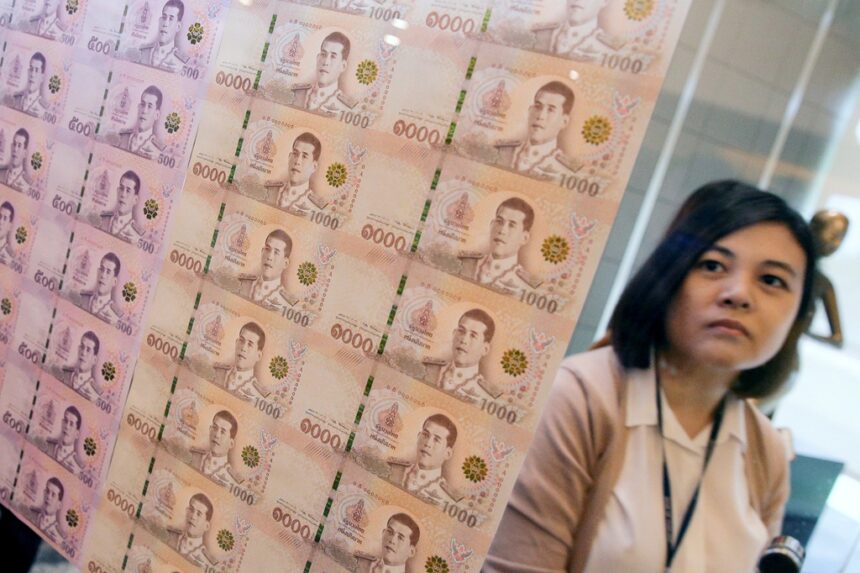BANGKOK— Thailand’s Public Debt Management Office (PDMO) is preparing to cut government borrowing by 8 percent for the year starting in October as the country faces new financial pressures.
The planned reduction, which would lower new government bonds to about Bt992 billion ($31 billion), highlights the country’s focus on financial credibility as public debt moves closer to the legal limit of 70 percent of GDP.
Sources close to the process say overall borrowing, including refinancing old debt, will drop to Bt2.37 trillion from the current year’s Bt2.57 trillion. This shift comes after plans for an 8 percent increase in borrowing for 2025, showing a quick move towards tighter budgets.
Last week, Patchara Anuntasilpa, head of the PDMO, spoke to bond dealers online about the changes but made no public statements. The government’s spending plan for 2026, worth Bt3.78 trillion and now law, forecasts a Bt860 billion deficit. This is slightly lighter than the current year’s deficit of Bt880 billion, leaving little flexibility.
Thailand’s public debt reached Bt12.1 trillion, or 64.2 percent of GDP, by mid-2025. Compared to many other developing countries, this remains manageable. But the PDMO warns the debt ratio could climb to 67.3 percent by the end of 2026 if growth stays at 3 percent, or 68 percent if growth drops to 2 percent.
Stagnating output would keep the figure under the ceiling, but growing international trade issues, including steep US tariffs on Thai goods, have made officials cautious. “This is what fiscal discipline looks like,” said a finance ministry insider. “We are sticking to the rules.”
Thailand’s Household Debt
The clampdown on borrowing comes as Thailand, Southeast Asia’s second-largest economy, faces serious challenges at home and abroad. While growth reached 3.1 percent in the first quarter (a pleasant surprise), full-year figures are expected to slow steeply to around 1.8 percent, well below recent World Bank hopes of 2.9 percent. Weaker exports and lower local spending are to blame.
Thailand’s central bank has now lowered its 2025 growth outlook to 2.3 percent, pointing to companies pushing shipments out before US tariffs take effect. Even that revised rate may be too high as tourism slows and families cut spending to reduce debt.
Household debt, always a sore point, continues to strain consumer spending, which accounts for much of GDP. Official data showed formal household loans at Bt16.35 trillion in the first quarter, 87.4 percent of GDP—the lowest since 2019 but still very high. Tighter lending standards and fewer new loans have helped bring this down from 88.4 percent at the end of 2024.
But these numbers do not tell the whole story. A Chulalongkorn University report, made for the Joint Standing Committee on Commerce, Industry and Banking, puts the real figure at 104 percent of GDP when counting informal debt. Four in ten households have informal loans, with an average owed of Bt98,538 per family. This high level of hidden debt leaves many families vulnerable.
Bad loans are rising across personal, car and home borrowing, pointing to worsening debt quality. The IMF is calling for a joint approach: targeted debt relief, faster bankruptcy options and limits on new lending, following the example of Ireland and Croatia.
Property Market Stalling
The government has eased some rules, for example, allowing more flexible loan-to-value ratios for refinancing, but critics claim these measures only scratch the surface. “Household debt is holding back the middle class,” says Payong Srivanich, CEO of Krungthai Bank and chair of the Thai Bankers’ Association.
With nearly half of GDP from the informal sector and just 11 million tax filers out of 68 million people, the tax base remains much too narrow to support more relief without adding to the deficit.
Thailand’s property market adds to the trouble. New condominium projects in Bangkok fell to 373 units in the second quarter, a sharp 94.2 percent drop from last year and the lowest level in 16 years. Higher borrowing costs, rising construction prices, and worried buyers all play a role.
Home transfers dropped over 10 percent in the first quarter from the year before, with low-rise homes down 12 percent and condos 7.3 percent lower. The total value of transactions fell by 13 percent to Bt181.5 billion. Supply is building up: SCB EIC analysts predict a slow recovery, with too many unsold homes and about 70 percent of mortgage applications turned down.
Yuttachai Teyarachakul, UOB Thailand’s managing director, has called this the property sector’s toughest crisis in a hundred years, with negative home loan growth expected for the first time ever.
Developers are cutting prices and waiting to start new sites. The central bank’s temporary easing of loan rules, now extended, gives little help to most buyers. House prices rose 2.7 percent nationwide in the second quarter, mainly due to rising land costs, but the number of properties sold is falling. This sector, a key employer and economic support, is suffering badly and could mirror Japan’s “lost decade” if incomes stay flat.
Tourism Numbers Flat
Tourism, once a reliable growth source, is no longer driving the economy. Visitor arrivals hit 19.3 million in the first seven months, 6 percent lower than last year, and revenue dropped by 4.2 percent. Thailand’s rivals in the region are winning market share.
Chinese tourists, who brought in Bt576 billion last year with 6.7 million visitors, have plunged to only 2.3 million in the first half, 32 percent down, and are set to miss five million for the year (not counting pandemic years). Stories of crime circulating on social media, plus more choices at home and easier visas for places like Malaysia (which saw Chinese arrivals jump 22 percent to 1.12 million in the first quarter), are drawing travellers away.
Malaysia is now Thailand’s biggest single tourism market, with 2.36 million visitors by May, but these travellers spend less than Chinese visitors—around Bt40,000 per trip compared to Bt60,000. Meanwhile, Japan saw foreign arrivals reach 21.5 million in the first half, up 21 percent, showing how fierce the competition has become.
Thailand’s target for tourism income has dropped from Bt2.3 trillion to Bt2 trillion, with a new focus on “high-value” tourists from India, the US and Europe. These markets are growing fast, but remain too small to fill the gap.
The Tourism Authority is pushing for sustainable projects and food festivals, but worries about security, Myanmar earthquakes, and global economic troubles add to the hurdles.
The Finance Minister has talked about emergency borrowing, but with the debt cap looming, there’s not much room left. “We are walking a tightrope,” said an advisor. “Keeping space in the budget is our only shield.”
There are signs things could improve: exports might bounce back if tariffs ease and new tourism niches—from smaller Chinese cities to Bhutanese travellers—could help. But without big policy changes such as tax reform or better job skills, Thailand risks staying stuck in a middle-income trap.
Cutting borrowing is a cautious step, but with growth at just 1.8 percent, restraint by itself will not get the economy moving again. As one Bangkok bond trader summed up, “We’ve trimmed the fat, but are we any stronger?”














